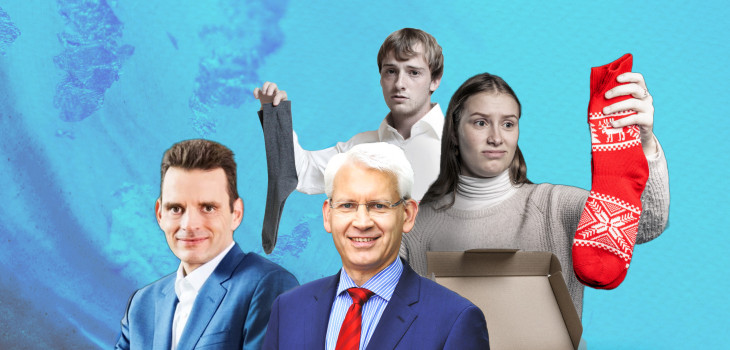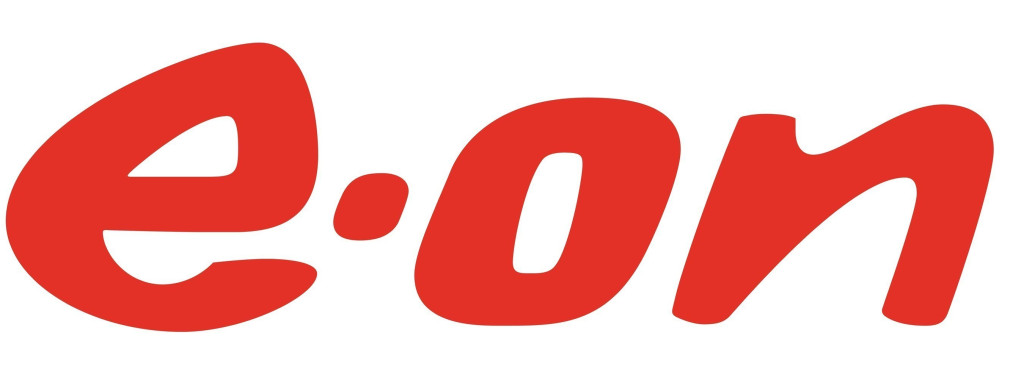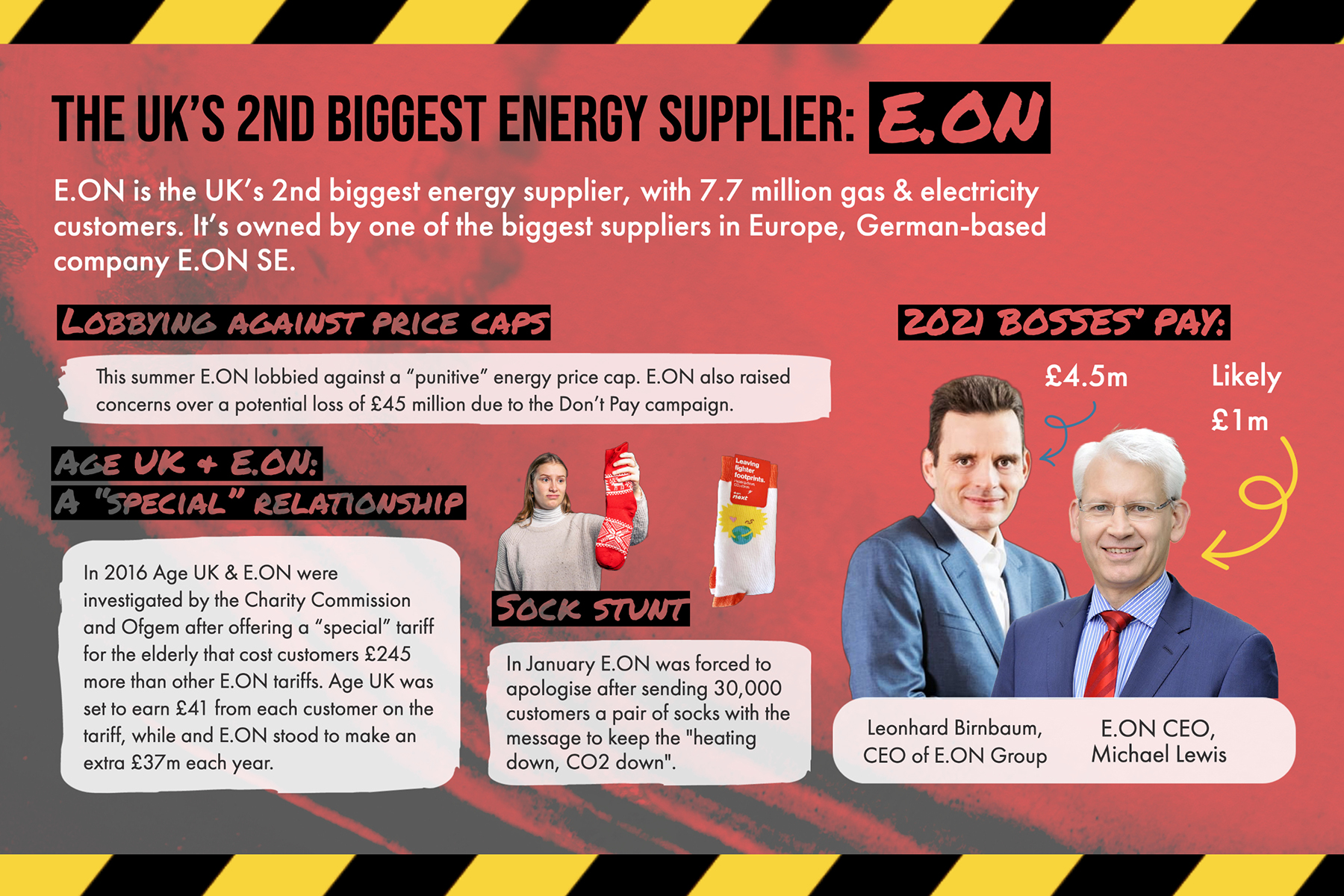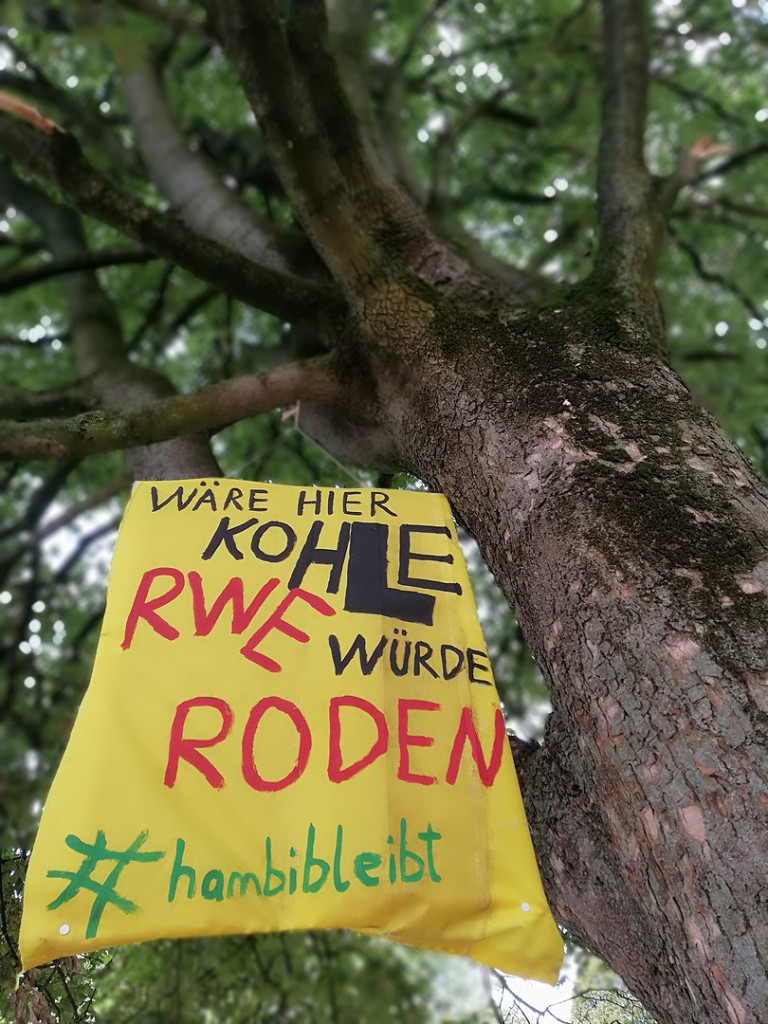Heat the Rich? Part five: E.ON

Throughout this Autumn Corporate Watch has been taking a critical look at the top six UK energy suppliers, in solidarity with the millions of people who are struggling to keep warm now that energy bills have risen once again.
We ask: who is profiting from supplying our energy? How much are the bosses getting paid? and how have these companies been cosying up to government?
We hope that our research can be a useful resource for those organising towards a mass non-payment of energy bills.
We will be releasing our alternative company profiles of the Big Six energy suppliers in reverse order over the coming weeks. You can see our profiles on Scottish Power, EDF, Octopus Energy and Ovo Energy here. Next up?
E.ON: the UK’s 2nd largest supplier

E.ON is the second biggest energy supplier in the UK, currently controlling 16% of the energy supply market. E.ON mainly focuses on distribution and supply, as well as nuclear and renewable energy (clean in Europe, but with a 50% stake in a coal power station in Turkey).
A German-based energy utility company operating worldwide with 50 million customers, E.ON is one of the biggest energy suppliers in Europe. We’ve featured E.ON before as the company made it onto the nuclear list in our ‘Wreckers of the Earth’ directory, as one of the top 300 companies with London offices profiteering from wrecking our planet.
But where would we be without Michael Lewis, E.ON’s UK CEO a supposed “environmental expert”, who took it upon himself to speak out on behalf of the UK public in spring, criticising the government’s inaction over energy bills. He proposed interventions like insulation and home upgrades to help the 40% of UK households likely to fall into fuel poverty this year because they can’t afford ever-rising energy bills. Unsurprisingly, Lewis’ critique didn’t quite cover curbing energy companies’ prices or introducing a windfall tax. And of course, on his seven-digit salary, it’s not likely that Lewis will really understand the impact of fuel poverty first-hand this winter.
Like most corporations these days E.ON boasts about its sustainability credentials. Whether it be lobbying against the ‘existential’ threat from the Don’t Pay campaign, 72% hikes in annual salary for E.ON management members, or dubious tariffs for the elderly costing an extra £245. In this profile, we show that E.ON is very good at promoting sustainability, but only it’s own. It’s a different story when it comes to its customers.
How many UK energy customers does E.ON have?
Electricity (excluding pre-payment): 4.6 million
Gas (excluding pre-payment): 3.1 million
Who runs it?

Lewis calls the shots for in the UK, he has been CEO of E.ON in the UK since 2017. Starting as an environmental consultant in E.ON (known then as Powergen) in 1993, Lewis has had a long career at E.ON. In 2002, he was vice president of corporate development at E.ON’s Headquarters in Germany, climbing up the E.ON ladder to become the European managing director for Climate and Renewables in 2007. Now on a salary of over £1 million a year, Lewis won’t be hurt by the current cost of living crisis. When he’s not at E.ON, Lewis is on the government’s National Environment Research Council board, making decisions about who receives public money for research into environmental science in the UK.
Lewis’ boss, Leonhard Birnbaum the CEO of E.ON SE since April 2021, boasted a pay package of €5.2 million (£4.5 million) in 2021. His salary is ‘capped’ at a mere €7.6 million (£6.5 million). Birnbaum has an expansive international network. He holds other positions including as the vice chair for the UK-based World Energy Council, “the world’s principal and impartial network of energy leaders” alongside former Shell and PWC directors, as Vice-President of the German Association of Energy and Water Industries (BDEW) and as the Vice-President of Eurelectric, the European Electricity Association alongside the outgoing head of the EDF (UK’s 4th biggest supplier), Jean-Bernard Lévy. Birnbaum previously clocked up 12 years at management consultancy McKinsey, before switching to RWE in 2008 (E.ON’s biggest single shareholder), leaving to join E.ON management in 2013.
Unsurprisingly, while our bills go up, management’s salaries do too, Thomas König, the Chief Operating Officer had a 72% increase in pay between 2021 and 2020. Alongside Birnbaum and König, there are three other officers on E.ON SA’s top management board. Discounting Birnbaum, together the officers took home a total salary of €8.7 million (£7.5 million) in 2021. But it’s not just the management board cashing in on the cost of living crisis: E.ON’s supervisory board, which is made up of 20 members, received compensation totalling €4.3 million (£3.7 million) in 2021.
Who owns it?
The ultimate parent company in the UK: E.ON Holdings Ltd, is owned by German-based company E.ON Se according to Companies House. In turn E.ON Se is owned by multiple shareholders.
RWE AG is the biggest single shareholder holding 15% of shares after making one of the biggest transactions in German history. Notorious as one of Europe’s top CO2 emitters, and another Wrecker of the Earth, RWE is responsible for the largest quantity of CO2 emissions in the UK. Backed by BlackRock, RWE took over E.ON’s renewable activities in 2018.
But greenwashing will not erase RWE’s past, the company is renowned in Germany (and further afield) for deforestation. In the 1970s RWE brought the ancient Hambacher Forest to mine coal destroying over 90% of 5,000 hectares of forest. Between 2008 and 2013, Birnbaum, the current CEO of E.ON SE, sat on the management board responsible for this destruction. In 2014 eco-defenders fought back against RWE, occupying the forest. Campaigners built tree houses starting the movement “Hambi bleibt” (Hambi Stays). But in 2018, RWE CEO Rolf Martin Schmit insisted “there’s no possibility of leaving the forest standing”, as police carried out RWE’s work in destroying peoples’ homes.

Other profiteers pocketing E.ON customers’ increased profits include Capital Group Companies Inc, one of the world’s oldest investment management companies, owning 10.16% of shares. Closely followed by the Government of Canada with 8.14% shares.
Is E.ON suffering as a result of the cost of living crisis?
Doesn’t seem so, in fact, quite the opposite. The ultimate parent company E.ON SE reported a 17% annual increase in revenue in 2021 to £75.3 billion. And profits weren’t so bad either, up over £3.4 billion from 2020 to £4.5 billion in 2021.
Where’s the profit going?
As households struggle to meet the surge in bills E.ON SE paid out a record €1.3 billion (£1.1 billion) in dividends in 2021. Company shareholders will likely be saying ‘cost of living crisis? What crisis?’, as E.ON’s customers foot the bill for these increased payouts.
E.ON’s success isn’t limited to the parent company. Whilst customers feel the pinch, E.ON PLC reported profits of £417 million in 2021 up £78 million from 2020. Topped up by the government, via the Coronavirus Job Retention Scheme, E.ON received £27 million in the last two years, £26 million alone in 2020.
E.ON’s latest UK Scandals
Despite offering a self-proclaimed “no” to corruption and illegal activity, E.ON has had its fair share of scandals. In 2014, the company was fined and forced to payout at least £20 million to its customers after energy regulator Ofgem found that E.ON misled and mis-sold tariffs on a mass scale between 2010 and 2013.
E.ON didn’t learn after it got caught in 2014. Just two years later in 2016, E.ON was exposed, yet again, this time for exploiting vulnerable customers out of £37 million. In 2016, E.ON in collaboration with AgeUK, a charity aiming to support older people, offered a special rate for gas and electricity for the elderly. AgeUK encouraged people to switch to E.ON, earning £41 for each person who signed up for the tariff. Then, in February 2016, it was revealed that the 152,000 customers on this ‘special‘tariff were paying £245 more than people on other E.ON tariffs. It turns out that E.ON and Age UK had a ‘special relationship’ that led to an investigation by the Charity Commission and Ofgem.
And it doesn’t stop there. E.ON was recently forced to apologise after sending ‘free’ socks to 30,000 customers urging them to keep the “heating down, CO2 down”. The socks were emblazoned with a heartwarming image of sunshine hugging the earth. Customers pointed out the irony of such a shallow and costly gesture:
So with energy bills about to rocket, @eon_next @eonenergyuk thinks the best thing to do is to send customers (my mother in this case) a pair of socks…..
Just think of the cost both £££ and environmentally of this stunt 🤦🏻♀️ pic.twitter.com/TG11vB8G5x— niffy (@niffy81176820) January 12, 2022
@EON_SE_en @MartinSLewis @BBCTheOneShow @theJeremyVine @gompertz my elderly auntie on income support just received this pitiful package from her energy company!! A packet of polyester socks. Are they 4 real?? As if suggesting cuddling ur pets wasn’t bad enough? Shame on u E-On pic.twitter.com/lx8MYvrXuy
— Sarah Collins (@Sc0lly) January 12, 2022
E.ON’s Political donations in the UK
Between 2003-2007, when the Labour Party was still in power, E.ON (including subsidiary Powergen) donated a total of £18,000 to the party. In 2016 E.ON donated £8,400 to the Conservative Party.
Does E.ON have close relationships with the Government?
Over the last decade, E.ON has had at least 90 meetings (nearly 50% took place in the last two years) with ministers and the PM. E.ON participated in business group meetings with former prime ministers David Cameron and Theresa May about European business in 2013 and Brexit in 2018. More recently, E.ON has had private meetings about the energy retail crisis and energy efficiency with Kwasi Kwarteng, amongst others. The company has also participated in at least 13 group meetings along with the rest of the Big Six energy suppliers over the last year.
In 2021 E.ON, alongside EDF and petrochemical company INEOS, held a stall at the Conservative party conference. Featured in the conference brochure, E.ON claimed to Conservative readers that it was committed to “making energy cleaner”, but tellingly there was no commitment to making it affordable.
In fact, an OpenDemocracy investigation revealed that E.ON has been actively lobbying the government against the “punitive” energy price cap complaining it’s an “unattractive time to be an energy supplier”. E.ON also voiced concerns over the Don’t Pay campaign predicting potential losses of £45 million. In turn, E.ON’s data analysis was shared with the Treasury and CEO Lewis pencilled a letter directly to Kwasi Kwarteng when he was Minister of Business, Energy and Industrial Strategy and Nadhim Zahawi, the Chancellor at the time.
Company addresses
UK Headquarters: Westwood Way, Westwood Business Park, Coventry, CV4 8LG
Ultimate parent company: E.ON Societas Europaea, 1 Brusseler Platz, 45131 Essen, Germany
